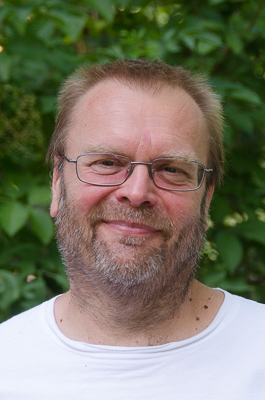Dr. Miklós Sárospataki - MATE Research
Overview
Dr. Miklós Sárospataki is an associate professor at the Department of Zoology and Ecology, Institute for Wildlife Management and Nature Conservation. He serves as head of the Department of Zoology and Ecology.
His research focuses on pollinators, especially wild bees, mostly on bumblebees.
Dr. Miklós Sárospataki's work contributes to the conservation biology and ecology of bees, and to the assessment of the effects of pollinator diversity loss at local and landscape scales.
His research has investigated the effects of neonicotinoids on bees, the vulnerability of wild bee species in Hungary, the effectiveness of wildflower strips on pollinator diversity, and the effects of landscape structure on pollinators, particularly in agricultural landscapes.
Dr. Miklós Sárospataki played a pioneering role in the development of the red list of Hungarian bumblebees and megachilid bees, thus contributing significantly to the conservation of wild bees in Hungary.
He authored and co-authored 68 research articles in high-impact scientific journals.
Dr. Miklós Sárospataki has collaborated with several research groups across Hungary and Europe, and he has successfully applied for about 8 research grants nationally and internationally. He won the prestigious MTA Bolyai János Research grant and the SZIE Grassalkovits grant.
Research keywords:
Publications
Woodcock, B. A., Bullock, J. M., Shore, R. F., Heard, M. S., Pereira, M. G., Redhead, J., Ridding, L., Dean, H., Sleep, D., Henrys, P., Peyton, J., Hulmes, S., Hulmes, L., Sárospataki, M., Saure, C., Edwards, M., Genersch, E., Knäbe, S., Pywell, R. F. (2017): Country-specific effects of neonicotinoid pesticides on honey bees and wild bees. Science 356, 1393–1395 https://www.science.org/doi/10.1126/science.aaa1190
Bihaly, Á., Kovács-Hostyánszky, A., Szalai, M., Sárospataki, M. (2021): Nesting activity of cavity-nesting bees and wasps is lower in small-scale apple orchards compared to nearby semi-natural habitats. Agricultural and Forest Entomology, 23:49-58. doi: 10.1111/afe.12403
Demeter, I., Balog, A., Sárospataki, M. (2021): Variation of small and large wild bee communities under honey bee pressure in highly divers natural habitats. Frontiers in Ecology and Evolution, 9:750236. doi: 10.3389/fevo.2021.750236
Elizabeth M. Alejandre, Laura Scherer, Jeroen B. Guinee, Marcelo A. Aizen, Matthias Albrecht, Mario V. Balzan, Ignasi Bartomeus, Danilo Bevk, Laura A. Burkle, Yann Clough, Lorna J. Cole, Casey M. Delphia, Lynn V. Dicks, Michael P.D. Garratt, David Kleijn, Aniko Kovacs-Hostyanszki, Yael Mandelik, Robert J. Paxton, Theodora Petanidou, Simon Potts, Miklos Sarospataki, Catharina J.E. Schulp, Menelaos Stavrinides, Katharina Stein, Jane C. Stout, Hajnalka Szentgyorgyi, Androulla I. Varnava, Ben A. Woodcock, Peter M. van Bodegom (2023): Characterization Factors to Assess Land Use Impacts on Pollinator Abundance in Life Cycle Assessment. Environmental Science & Technology. 57, 8, 3445-3454. doi: 10.1021/acs.est.2c05311
Bihaly, Á. D., Piross, I. S., Pellaton, R., Szigeti, V., Somay, L., Vajna, F., Soltész, Z., Báldi, A., Sárospataki, M. & Kovács-Hostyánszki, A. (2024) Landscape-Wide Floral Resource Deficit Enhances the Importance of Diverse Wildflower Plantings for Pollinators in Farmlands. Agriculture Ecosystems and Environment. https://doi.org/10.1016/j.agee.2024.108984
Projects
EASY, EU FP5; Evaluating current European agri-environment schemes to quantify and improve nature conservation efforts in agricultural landscapes
Participant
Agri-environment schemes play an increasingly important role in CAP to support biodiversity and environment in agricultural landscapes. They have been implemented since 1992. Still, there is no conclusive evidence that these schemes actually do contribute to the conservation of particularly biodiversity. The primary objective of this project is to evaluate the (cost-) effectiveness of European environment-environment schemes in protecting biodiversity and to determine the primary processes that determine their effectiveness. This project furthermore aims to determine how the CAP may be introduced in candidate EU-members without unacceptable loss of biodiversity. It will provide simple guidelines how researchers, governmental authorities may efficiently evaluate agri-environmental measures.
https://cordis.europa.eu/project/id/QLK5-CT-2002-01495
QUESSA, EU FP7; Quantification of ecological services for sustainable agriculture
Participant
The QuESSA project aimed to quantify the contribution of SNH such as hedgerows, grass strips and woodland to key ES for sustainable agriculture. The project focused on pest control and pollination, but also included services such as erosion mitigation, carbon sequestration and aesthetic value. Research focussed around 16 case studies that included wheat, oilseed rape, sunflowers, pumpkins, pears, olives and vines across eight countries.
https://cordis.europa.eu/project/id/311879/reporting
Safeguard, Horizon 2020; Safeguarding European wild pollinators
Participant
Wild pollinators, which play a vital role in European biodiversity and agriculture, are decreasing in number. The EU-funded Safeguard project aims to reverse this trend by bringing together world-class researchers, NGOs, industry and policy experts. Using state-of-the-art models to identify emerging threats, consortium members will work with stakeholders to develop and test new approaches that benefit pollinators from field to landscape scales across agricultural, natural and urban systems. Safeguard will create an integrated assessment framework and tools that incorporate multiple types of evidence to prevent pollinator decline and direct mitigation strategies at the local, national and EU levels. Safeguard will also inform national, European and global policies and decision-making and raise awareness of the contribution of wild pollinators to society.
https://cordis.europa.eu/project/id/101003476





